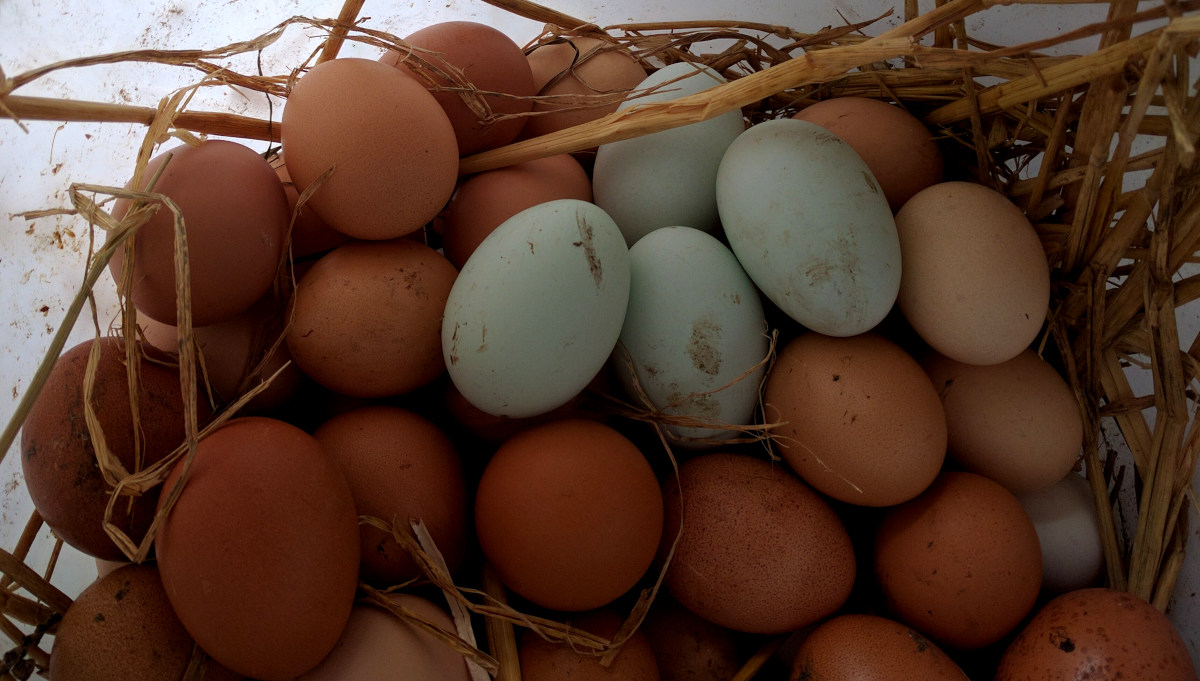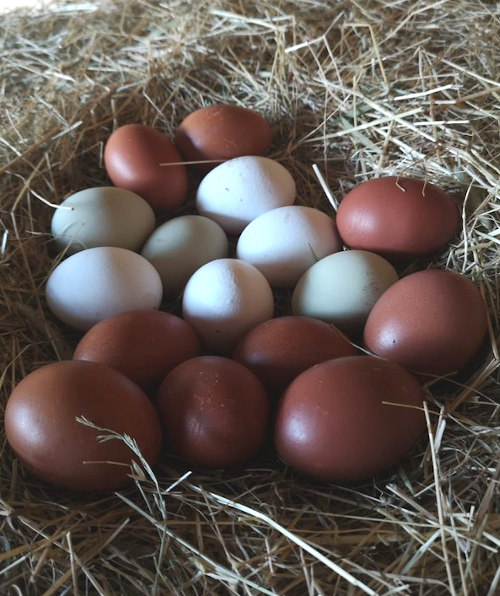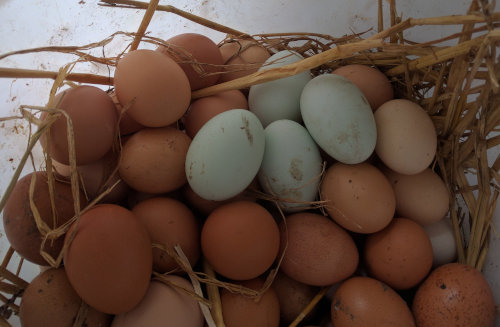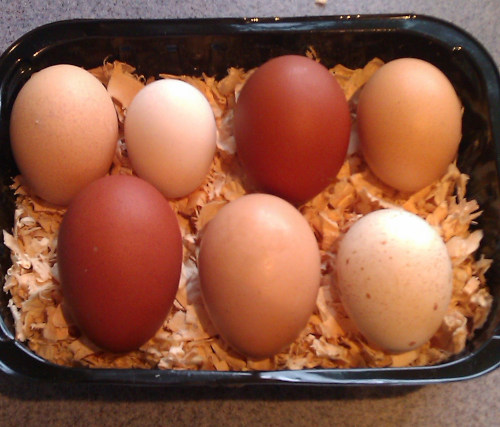How many eggs will my chickens lay?

My chickens produce an average of 0.63 eggs per chicken per day over the course of a year.
How many eggs will my chickens lay in a day?
This can be a bit of a tricky question since there is a lot of factors that go into how many eggs your chickens will lay.
Here is a table of how many eggs you can expect the average chicken to lay for each year of her life:
| Year | Number of Eggs |
|---|---|
| 1st year | 200-250 eggs |
| 2nd year | 150-200 eggs |
| 3rd year | 100-150 eggs |
| 4th year | 50-100 eggs |
| 5th year and beyond | 0-50 eggs |
Please note that these are just general guidelines and the actual number of eggs a chicken lays may vary depending on the breed of chicken, her health, and her diet.
A laying hen can only lay one egg a day. It takes 26 hours for an egg to be produced and one has to be finished before another can begin. For chickens there will be some days when it she not produce an egg at all.
Below: Every chicken keeper loves a nest full of eggs.

It is possible that some young chickens in spring may produce two in a day but this is the exception rather than the rule.
How many eggs to expect from laying hens:
Eggs are of course one of the main reasons many people are interested in raising backyard chickens. To this end, people want to know how many eggs their backyard chickens will produce.
The actual number of eggs you will get from your chickens depends on:
- The breed - Hybrids lay more eggs.
- The age - Older birds lay fewer eggs.
- How healthy and well fed they are - properly nourished chickens lay more eggs.
- The time of year - nearly all chickens slow down in winter and stop when they moult.
- With the rise of industrial farming and most people having no idea who raises their food, many people are becoming more and more interested in growing or raising some of their own food.
Do hens lay everyday?
Modern hybrids tend to lay and egg every day but heritage or rare breeds normally only lay for 4 or so days before having a day off.
Some chicken breeds, such hybrids or Rhode Island Reds, can lay between 250 to 280 eggs per year. Rhode Island Reds are one of the most popular backyard breeds, due to their very friendly demeanour and their tough, capable attitudes.
Below: My daily egg collection from my laying flock.

This is why it’s important to research your chicken breeds before buying them. Some chicken breeds are more favoured for meat, while others are more prone to becoming broody and temperamental.
A hen will naturally lay between 180 and 260 eggs a year with modern egg laying hybrids producing 300 or more.
Beyond breed, a hen’s age will also greatly affect her ability to produce eggs.
While hens won’t simply stop laying eggs, but they will lay fewer as they get older. Most backyard breeds will maintain productive egg laying for five to seven years.
If you have heard that hens stop laying eggs at a year or two, this is only because the hens in industrial farming are slaughtered at this time because they lay maybe one or two eggs less a week and are not seen as being as productive.
Luckily, your backyard chickens are not part of a factory farm, so you don’t have to worry about slaughtering your girls when their egg production drops by one or two. A factory farm is about financial stability and business, while your backyard flock is about healthy eggs and happy hens.
10 breeds that lay the most eggs:
- Red sex links like Golden Comets or Cinnamon Queens.
- Leghorn.
- Rhode Island Reds.
- Barred rocks.
- Sussex types.
- Cream breasted legbars.
- Andalusians.
- Ancona.
- Wyandotte.
- Easter Eggers
Some hens will always be better layers than others.
Can chickens lay 2 eggs a day?
Yes, a chicken can lay 2 eggs in a day but it is very rare and tends to happen in mid spring when the days are getting longer and there is plenty of feed around. Producing eggs is hard work and requires a lot of energy.
Below: eggs come in all shapes and sizes:

How many eggs do chickens lay a week?
While most chickens will lay five eggs a week on average, that can vary depending on age, environment, and breed.
Fancy or heritage chickens, true bantams and meat chickens lay significantly fewer eggs and some breeds of chicken are seasonal layers, meaning that they only produce eggs in spring and summer. I keep La Bresse and they never start before March and rarely lay into October.
How many eggs do chickens lay a year?
The average chicken lays between 180 and 240 eggs per year but modern sex linked hybrids can lay 350 eggs per year under ideal conditions.
The breed of chicken plays a significant role in egg production. Some breeds, such as Leghorns and Rhode Island Reds, are known for their high egg production capabilities, and they can lay up to 300 eggs per year. Other breeds, such as Silkies, are not as prolific, and they may lay as few as 50 eggs per year.
The age of the chicken also affects egg production. After their first year, chickens can lay up to 80% of their maximum potential egg production. After their second year, this number drops to around 65%, and it continues to decline in subsequent years.
Sick or stressed chickens are less likely to lay eggs than healthy chickens. Ensure your chickens are healthy by providing them with a clean living environment, access to clean water, and a balanced diet.
Feeding your chickens a diet high in protein, calcium, and vitamin D can significantly increase their egg-laying capabilities. A diet rich in these nutrients can increase egg production by up to 20%.
Will chickens lay eggs all year?
They can do. A few years ago I hatched a batch of hybrids called an Amber Stars and the hens from that group laid a large egg every day for nearly 2 years before they started to decline, and this was quite far North in Yorkshire.
The normal egg cycle of the wild hen has been disrupted by gradually breeding out the effect of the genes that link egg laying cycle to light and seasons.
Commercially chickens are kept with extra hours of artificial light to keep them laying. This is to ensure profitability and continuity of supply chain. An egg business depends on regular production so hens are brought in ready to lay and kept in artificially long days for 80 weeks before being cleared out.
Maximising Egg Production:
Provide Optimal Living Conditions: Ensure your chickens have access to a clean and comfortable living environment. Provide them with a stress free spacious coop that allows them to move freely and nest boxes where they can lay their eggs.
Feed Them a Balanced Diet: Feeding your chickens a balanced diet is crucial for maximising egg production. Ensure their diet includes all the essential nutrients required for egg production, such as protein, calcium, and vitamin D.
Provide Clean Water: Chickens require clean water for optimal health and egg production. Ensure they have access to fresh, clean water at all times.
Provide Adequate Lighting: Chickens require adequate lighting to stimulate egg production. Ensure their coop receives natural light during the day and provide artificial lighting during the winter months.
How many eggs can a chicken lay in her lifetime?
A chicken will lay between 600 and 800 eggs in its lifetime.
Hens have a finite number of egg cells in their ovaries when they hatch. About 600 to 800 of these will go on to become eggs over the 6 year lifespan of a chicken.
Slow maturing and irregular layers like Silkies probably only produce half this amount in their life.
Chickens lay eggs for most of their lives. they start between 16 and 30 weeks, depending on the breed, and may lay for 6 or 7 years before finally stopping.
A chickens will lay around 800 eggs in it's life. If it is a hybrid it will lay those more or less continuously over 3 years and then stop. If it is a heritage or rare breed it will take 6 or 7 years to lay that many eggs and then stop.
Chickens don't die because they stop laying eggs, I have had some live to 11 years quite happily.
Hybrid chickens tend to lay eggs until they die, they have been bred to live fast and die young and the bodies cannot cope with that level of egg production for long. Heritage chickens do for the most part lay eggs all their lives but they lay less and less over the years. I have a few seven year old birds and they still produce a handful of eggs in the spring, around 20 or so.
I can only discuss trends and tendencies when it comes to how many and how long chickens lay eggs for as they are always individuals that buck the trend.
Commercially produced shop bought eggs come from chickens that are less than 80 weeks old. When they reach 80 weeks they are disposed of and new ones bought in to replace them. This is because they are no longer profitable after that as egg numbers and egg quality begins to decline with age.
How many eggs do chickens lay naturally?
Wild chickens naturally have an innate instinct to produce a full brood of eggs, 12 to 16, in order to form a clutch for incubation. You can see this behaviour in old breeds like Silkies that were never selected for high productivity, they have a habit of producing a flush of eggs and then go broody or have a week or two off from laying before starting again.
In order to help achieve the chickens’ maximum amount of egg laying in a year, they will need about 12 hours or more of light per day.
Weather can also impact a hens’ laying potential. Dark, gloomy days will cut down on your hens laying abilities since hens need Vitamin D to encourage the production of lots of nice, healthy eggs.
The more sunlight your hens get, the happier they will be, and the more eggs they will produce. This is why hens produce fewer eggs in winter or when they live in dark, cold climates.
You can help overcome this by installing a light in the coop that gets them up earlier in the morning. This helps trick the hens’ bodies into producing eggs like its summer. Though you must be careful with the colour of light you use the hen house. Chickens are quite photosensitive and if you use white light 24/7 in the winter and then abruptly turn it off in the summer, things can go quite haywire. If you are going to light your coop 24/7 for heat, use a red light since chickens don’t view red light as sunlight.
